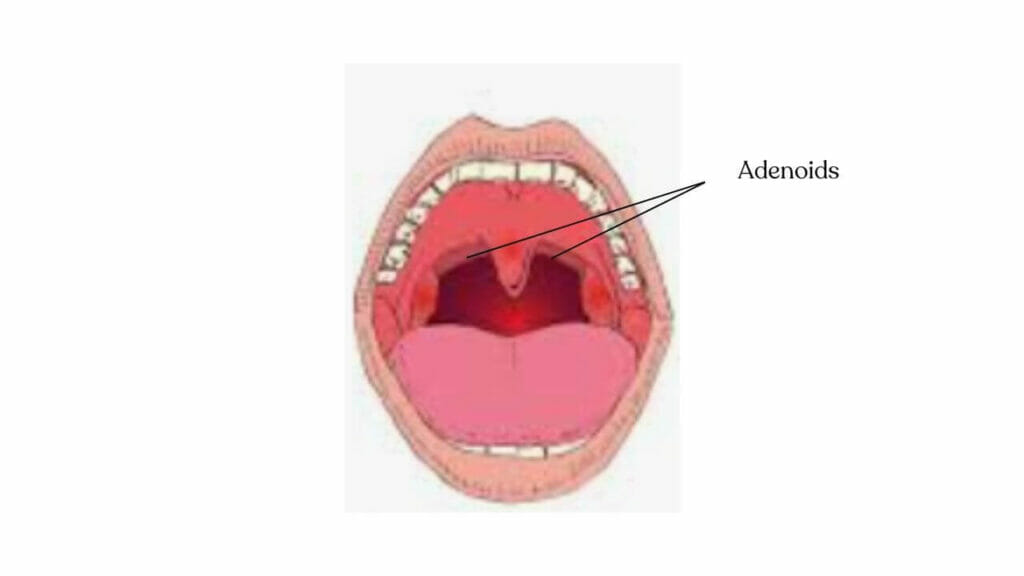Enlarged adenoids can cause a lot of discomfort and pain. While surgery is an option, there are also many home remedies that can help alleviate the symptoms. In this article, we’ll explore some of the most effective home remedies for enlarged adenoids you can try at home. From saltwater gargles to herbal teas, we’ll cover everything you need to know to get relief from this condition.
What are adenoids?
Adenoids are tissues like tonsils high up in the throat just behind the nose. They are part of the lymphatic system and prevent germs from entering your body. All children have them, but they are enlarged in some, causing a few troubling symptoms during respiratory illnesses.
The good thing is as the child grows, the adenoids keep shrinking and are almost gone when they reach adulthood.
However, your doctor may suggest adenoid removal surgery when the symptoms persist and cause other problems like a middle ear infection.
Since adenoids shrink as the child ages, removing adenoids can wait if the symptoms are not very troubling.
Adenoiditis – Inflammation of adenoids
Sometimes the adenoids get inflamed when preventing bacteria and viruses from entering your body. This condition is called adenoiditis. Some children are born with enlarged adenoids; in them, the swelling blocks the airways and causes difficulty in breathing.
This may manifest into an infection causing other symptoms such as a sore throat.
If the infection is caused by bacteria, your doctor may prescribe antibiotics, and your child starts feeling better in two to three days. When a virus causes the condition, it takes about two to three weeks to settle completely. Allergies may also cause adenoiditis; knowing and avoiding the allergens will help improve symptoms.
What are the symptoms of enlarged adenoids?
The adenoids may swell when bacteria, viruses, or allergens cause an upper respiratory infection. In children with enlarged adenoids, the inflammation often causes the following symptoms.
- difficulty breathing through the nose
- nasal voice while speaking
- snoring at night
- excessive mouth breathing at night
- feeling tired during the day due to poor sleep at night; school-going children may be less-attentive during classes
- dry mouth
- bad breath
- difficulty swallowing
What other problems can adenoiditis cause?
Quick aggravation of symptoms during respiratory tract infections is a common occurrence. Acute Otitis Media (AOM) or middle ear infection is another common condition caused by enlarged adenoids. This happens when the enlarged adenoids block the eustachian tubes, and mucus collects in the middle ear.
AOM may give your child ear pain, fever, and even temporary hearing loss when not attended to.
When there is no significant improvement in hearing, your doctor may suggest adenoid removal. However, you may try the following home remedies for swollen adenoids before opting for surgery.
Please note that it is important to discuss with your doctor about following these home remedies. If your doctor insists on surgery citing risks of partial hearing loss, you must get the adenoids removed.
Home remedies to relieve enlarged adenoids
The following home remedies can not only relieve enlarged adenoid symptoms but can also prevent recurring episodes of adenoiditis.
1. Steam inhalation
Do not try this remedy for infants and toddlers as they may tip the hot water harming themselves.
Steaming is one of the effective home remedies that relieve swollen adenoid symptoms. Make your child inhale steam twice a day.
How to do:
Boil water beyond its boiling point. It should bubble well while boiling. Pour the boiling water into a small pan and add a few drops of Eucalyptus oil or a pint of cold rub.
Make your child inhale the vapours well. Covering your child’s head with a blanket while inhaling the steam would be effective.
Benefits:
Steaming helps relieve congestion in the airways in the nose, improving your child’s breathing. It also thins mucus allowing it to drain from the middle ear and sinuses.
2. Ginger tea
This remedy is for children two years and up.
Ginger has excellent anti-inflammatory properties and will help ease inflammation in any part of the body, including adenoid swelling.
How to do:
Take 2-inch fresh ginger, peel the skin, and grate it. Add the shredded pieces to a cup of hot water.
Let it steep for 3 minutes. Then, strain the tea and add some honey to sweeten it. Honey has amazing antibacterial properties, so if the adenoid enlargement is due to bacterial infection, it can further help.
Make your child sip the warm tea. A few sips of ginger tea before bedtime may make the child sleep soundly.
3. Turmeric tea
This remedy is for children two years and up.
Curcumin, the active ingredient in turmeric, has excellent healing properties and can help relieve inflammation. In addition, turmeric also has great antibacterial properties. Hence, turmeric tea is a great home remedy for enlarged adenoids.
How to do:
Add 1 tsp organic turmeric to a cup of hot water. Let it steep until the water becomes warm enough to sip.
Having either of the teas twice a day is great. And turmeric or ginger tea at bedtime will aid good sleep with improved breathing and less snoring.
4. Limit dairy, cold foods, and sour-tasting foods
This applies to children of all ages.
According to Ayurveda, adenoid enlargement can aggravate with dairy and sour foods. So, restrict dairy products such as milk, cheese and curd. Also, it is good to limit citrus fruits.
In addition, eating or drinking cold foods may aggravate adenoid swelling, so restricting your child from anything cold will help.
5. Gargle three times a day
This remedy is for children who can understand and follow instructions.
Gargling with warm, salt water or water boiled with turmeric can eliminate harmful pathogens in your child’s mouth and is a trusted home remedy for swollen adenoids.
Instead, you may add 1/2 tsp Triphala powder to a cup of warm water and gargle. The antibacterial properties in the Ayurvedic formulation help get rid of bacteria and other germs and can also relieve bad breath.
6. Breathing exercises
Children who can understand and follow instructions may practice Pranayama. Babies and small kids can be encouraged to play games.
Having difficulty breathing through the nose and excessive mouth breathing during sleep are common symptoms of enlarged adenoids. Improving lung function and enhancing airways will naturally help the child breathe through the nose.
Hence, breathing exercises and games that promote good breathing, such as soccer, catch-me-if-you-can or Tag, can greatly help.
Alternate nostril breathing, or Nadi shodhana, can be a simple and effective breathing practice for the child. Nevertheless, they can start with deep inhalation and slow exhalation if pranayama techniques are hard to follow.
7. Avoid exposure to cold
This applies to children of all ages.
Cold air blowing into the child’s nose causes congestion immediately and leads to more difficulty breathing through the nose. So, if you live in places with cold weather, make sure your child wears protective clothing. People living in tropical climates may spend more time in air conditioning. In this case, ensure cold air from the air conditioner does not blow into the child’s face. Also, wearing protective clothing, including the nose, when travelling outside is important.
The following Instagram post shares the home remedies in a slideshow.
The bottom line
Enlarged adenoids in children are common, and as they grow into adulthood, adenoids shrink themselves. However, in some children, they may cause more trouble, and your doctor may suggest surgery to remove adenoids. Should you wait further or go for surgery depends on how bad the symptoms are and how difficult it is for the child. Meanwhile, use the suggested home remedies to lessen symptoms. And make preventive remedies a routine. They may provide necessary relief till the adenoids are gone naturally.
Images: canva.com


